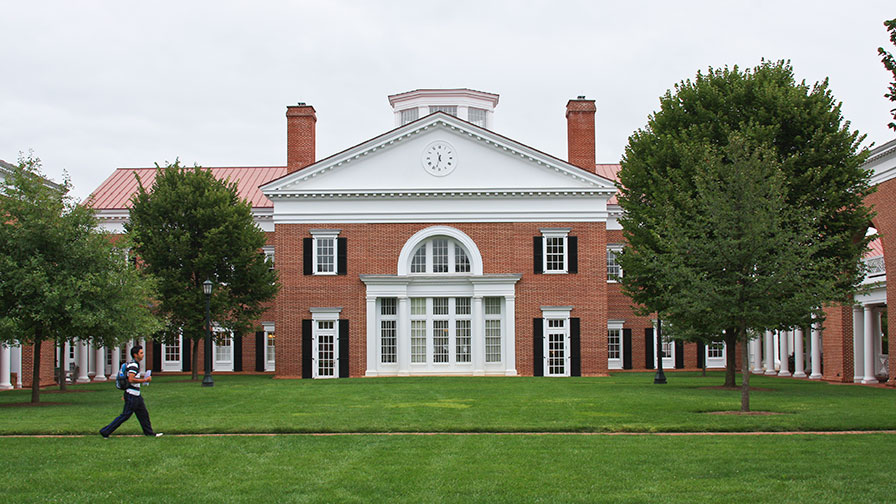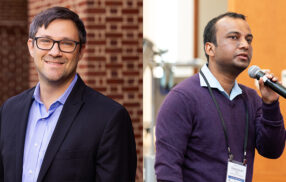
Tech and the New Career Frontier for MBAS
By Dave Hendrick
Technology companies, and West Coast technology companies in particular, are scorchingly hot.
Corporations such as Facebook, Google and Apple have, by conventional measures, grown to new heights in recent years, increasing market share and market cap and nestling their products firmly into the lives of an ever-growing user base — all while remaining widely beloved.
The most extreme example, Apple, is both the world’s most valuable company and the most-admired, according to Forbes. Google, the second most-admired company, has the world’s fourth-largest market capitalization.
Meanwhile, companies like Square that existed only on paper just a few years ago continue to grow into massive, multi-billion dollar enterprises.
Simply put, the sprawling technology sector remains on a sustained boom, attracting more attention, money and prospective employee interest than at any time since the dot-com era.
This environment means job opportunities for recently minted MBAs, as 93% of tech companies worldwide planned to hire MBAs in 2015, according to data released by the Graduate Management Admission Council. Notably, that figure is higher than the 84% of finance and accounting companies that planned to hire MBAs, feeding into an emerging narrative of Silicon Valley as the new heart of American capitalism.
Of course, pitting Silicon Valley versus Wall Street fails to fully consider the vast swaths of the U.S. economy, workers and populace that do not fall into either paradigm. Too, there remains massive interconnectedness between the finance and technology sectors.
Still, few places saw stronger economic momentum in recent years than Silicon Valley and the San Francisco Bay Area. While the broader U.S. economy inched upward in fits and starts, the Bay Area economy — driven largely by the booming success of tech companies — blossomed.
Ask anyone who’s tried to buy a home or rent an apartment in the Bay area in recent years in order to get a glimpse into an economy that seems to play by its own rules.
So when the pulse of American capitalism increasingly seems to beat strongest on the West Coast, what are the implications for a business school in Charlottesville?
Darden in Silicon Valley
The University of Virginia Darden School of Business has made multiple strides to develop leaders fit for the West Coast technology world in recent years, establishing formal relationships with the Silicon Valley technology incubator Plug and Play, hosting events such as a West Coast Innovators Roundtable with top executives and taking regular “tech treks” to strengthen the recruiting pipeline for Darden students.
In perhaps the most explicit embrace yet of the area, the Global MBA for Executives(GEMBA) program will hold part of its sixth and final residency in San Francisco in April 2016.
The final residency includes courses focused on innovation and entrepreneurship and exposure to Silicon Valley venture firms and technology companies, including Apple.
San Francisco was the obvious spot to emphasize the focus on entrepreneurship, according to Professor Yiorgos Allayannis, associate dean for the GEMBA program.
“It’s hard to understand a place or a sector like technology unless you experience it,” Allayannis said. “It’s more compelling to be in the environment that generates the source of ideas that become the basis for business — or even living.”
Indeed, even if most of the GEMBA students do not go into technology jobs, they will almost certainly go into jobs working with technology, given the saturation of technology in the professional sphere.
“Our students invariably are going to work with technology and they have to not just master it but they have to have a view as to where these technological changes are going to lead us,” Allayannis said. “It’s very difficult to do that unless you are equipped to understand where the world is going — and technology is shaping that world.”
While the GEMBA residency in San Francisco is relatively brief, Allayannis and the broader Darden leadership view the program as another bridge between Darden and the technology community, strengthening alumni bonds, recruiting pipelines and the recognition of the Darden name in the technology community.
Students Drawn to Technology Jobs
Darden students have had great success in the job market after earning their MBAs. Better than 96% of the Class of 2015 had a job offer within three months of graduation, and those varied jobs had a mean base salary of more than $119,000.
For a growing number of Darden students, technology jobs can offer the prospect of doing more meaningful work earlier in a career, according to Adrienne Brewbaker (Class of 2016), the president of the Darden Technology Club.
“At these tech companies, there is usually less bureaucracy and fewer barriers to making impact, and I think that’s what’s so appealing to MBAs,” Brewbaker said. “You can get in there and provide value from the get-go, without having to work your way up the chain the way you may have to in more traditional companies.”
Brewbaker, who came to Darden after four years in IT consulting at IBM, spent her summer interning at Microsoft in Seattle, working as a product marketing manager intern on the Surface team.
Longtime Darden Professor James Freeland said he increasingly notes a desire among students to create something that people want to use. Whether myth or fact, the perception is that the technology world affords such opportunities.
“It’s not a question of making more money, it’s a question of creating value for people, and the sense is if I do a really good job of that, I’ll be rewarded,” said Freeland, who teaches about technology within the operations sphere. “People think they can do something that’s really interesting and can change the world.”
The signs of the growing interest in technology and technology jobs around Grounds are easy to find.
The Darden Technology Club has grown every year, with membership now at an all-time high of around 240 members. Roughly 15% of students in the Class of 2015 have taken jobs in the tech field and about the same percentage took internships in the sector in 2015.
Amanda Panarese, who focuses on the technology space in her role as associate director of career education and advising at Darden, said the interest level is clearly growing among students. So, too, is the interest level among many technology companies rising steadily. Echoing an often-heard refrain, Panarese said the general well-roundedness of Darden students makes them appeal to certain technology companies.
“I think our students bring a passion for the industry and combine that passion with their work ethic and ability to work across functions in a team environment,” Panarese said. “That combination of hard and soft skills makes our students especially strong in tech, when you need both skills to work across functions and teams to bring about results quickly in a constantly-changing environment.”
In a clear sign of the burgeoning interest Darden’s Career Development Center sees from students and the growing demand for MBA talent from technology company recruiters, technology was the only sector — as opposed to a discipline such as marketing or consulting — featured at Darden’s 2015 Career Discovery Forums.
“In the CDC, we expect to see continued growth and expansion in this area according to MBA 2017 and prospective 2018 student interests and global market trends,” said new Assistant Dean for Career Development, Chequeta Allen, who joined Darden in October after 10 years working in Silicon Valley, including a role at Oracle in global marketing. “We are planning enhancements to our career programs to ensure optimal student readiness across functions for tech job search.”
At the forum, Microsoft Senior Marketing Manager Javier Nino (MBA ’07) said the diverse education he received at Darden led to his success in a multi-faceted technology job.
“The benefit of the tech industry is that in any role you have many fields in one,” Nino said. “Right now, I’m doing some entrepreneurship, I do strategy, I do general management and I do business development. You need to have a piece of each of all these disciplines.”
Teaching for Tomorrow
The Darden curriculum has long displayed technology-relevant concepts such as design thinking, effectuation and entrepreneurship, and certain new courses are more explicit in their technology focus, such as Alex Cowan’s electives, “Software Design” and “Software Development,” or Professor Casey Lichtendahl’s “Data Science in Business.”
Cowan, a fellow at the Batten Institute for Entrepreneurship and Innovation who splits his time between the Silicon Valley area and Charlottesville, says he and his colleagues are working to make the Darden MBA a must-have feature at technology companies.
Darden has a strong relationship and recruiting pipeline with large and established outfits such as Amazon, Microsoft and eBay, among others, and a growing a growing track record of alumni succeeding with technology-drive businesses — but more can be done.
“You read a lot of cover stories about how the traditional MBA is in crisis, questioning its ability to help managers innovate,” Cowan says. “And yet in Silicon Valley, companies are rethinking and experimenting with core disciplines like product management and marketing.”
Cowan thinks this paradox heralds a tidal shift, and a huge opportunity for a school like Darden.
“The MBA [graduate] who’s a marriage of the brand manager at Nestle with in-demand digital innovation skills is a fantastic employee that I think everyone will covet,” Cowan said. “They don’t really exist in very large numbers, and I think we’re in a great position at Darden to produce that sought-after individual.”
Cowan’s current course, “Software Design,” was capped at 40 but expanded to 49 students given demand. It aims to equip would-be technology leaders with skills in applied product design and practical innovation.
“To the extent the center of American capitalism is shifting, students need to learn product design skills, they need digital literacy and they need the creative confidence to engage on technical topics,” Cowan said. “That doesn’t mean becoming a career coder, but it does mean they need to know some things that most new students don’t know right now.”
The inclusion of technology literacy into a Darden education need not come at the expense of Darden’s core offerings, said Cowan, noting that the general management skills the School has long excelled in teaching have enormous use for many technology firms, from startups to Fortune 500 companies.
A Growing Tech Pipeline
Cowan’s vision of Darden as an ideal incubator of tech industry talent is similar to that of the Technology Club’s Brewbaker, although the former Microsoft intern suggests that the pipeline is already organically solidifying.
While Brewbaker admitted that certain networking opportunities are harder to come by at Darden simply due to geography, figures show that Darden places an increasing number of interns and graduates in major tech companies each year, seeding the field for future growth.
“The more Darden alumni we can get into the tech industry, the greater our reputation becomes, and we’ve already seen that start to happen,” Brewbaker said “I really think that our way to get into these tech companies is by leaving a legacy of talented people. Year after year, our alumni network becomes stronger and stronger.”
And indeed, Amazon and Microsoft were tied for third place among landing spots for members of the Class of 2015, with only McKinsey & Co. and Boston Consulting hiring more Darden MBAs. Over the last two years, Amazon has hired 22 new Darden graduates and Microsoft another 17.
Brewbaker also applauds any move toward more technology in the Darden curriculum, but notes that students are not waiting for the introduction of formal courses.
Every other week the Technology Club hosts a “Tech Talk,” in which students gather in an informal setting to simply discuss relevant topics in the world of technology.
“These topics can sound kind of daunting, but we’re breaking them down and focusing on the business side of them,” Brewbaker said. “We’re not talking about augmented reality, for example, from a technical perspective. We’re talking about how you go to market with augmented reality and what industries you could see this new technology being applied to. It’s looking at tech innovations through a business lens.”
In The Real World
Helena Kim (MBA ’15) came to Darden after holding both finance and technology jobs after college in California. While the initial financial services and asset management positions were rewarding, Kim said she realized she loved the world of information technology, and particularly solving problems using technology.
If she was going to take her interests in IT and selling technology services up a rung, Kim said she needed to learn more about the wider world of business and the needs of her customers.
“Darden was the perfect place to be. You get to learn so many different businesses and all about your future customer,” Kim said.
In her current role as an enterprise marketing senior adviser for digital marketing and strategic event planning at Dell, Kim said she draws on her Darden education every day.
“We are selling to everybody, and that requires a lot of deep understanding of how other industries are running. Everything I learned at Darden has helped me to talk to our customers more competently. I have a better understanding of how businesses run and I can quickly pinpoint what my customer needs.”
Kim, who was an officer in the Technology Club, said prospective students who want to work in the technology industry don’t typically think of Darden as a top choice initially, but Darden can turn out a student who can make an impact at an established company or a startup.
Said Kim: “An MBA can bring a lot of benefits to a tech company. A Darden graduate can envision, create and share the bigger picture.”
The University of Virginia Darden School of Business prepares responsible global leaders through unparalleled transformational learning experiences. Darden’s graduate degree programs (MBA, MSBA and Ph.D.) and Executive Education & Lifelong Learning programs offered by the Darden School Foundation set the stage for a lifetime of career advancement and impact. Darden’s top-ranked faculty, renowned for teaching excellence, inspires and shapes modern business leadership worldwide through research, thought leadership and business publishing. Darden has Grounds in Charlottesville, Virginia, and the Washington, D.C., area and a global community that includes 18,000 alumni in 90 countries. Darden was established in 1955 at the University of Virginia, a top public university founded by Thomas Jefferson in 1819 in Charlottesville, Virginia.
Press Contact
Molly Mitchell
Associate Director of Content Marketing and Social Media
Darden School of Business
University of Virginia
MitchellM@darden.virginia.edu





